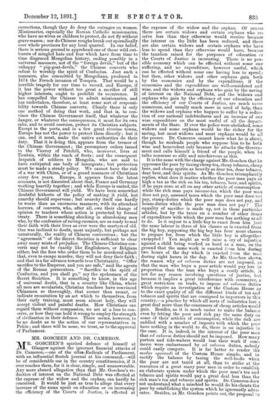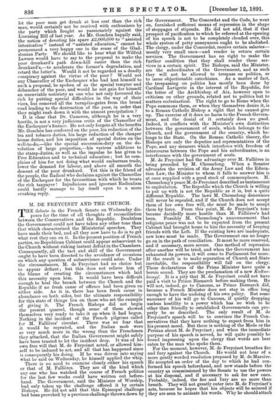MR. GOSCHEN AND DR. CAMERON.
MR. GOSCHEN'S spirited defence of himself at Glasgow against the ignorant financial attacks of Dr. Cameron,—one of the ultra-Radicals of Parliament, with an influential Scotch journal at his command,—will be of considerable use in the country constituencies, if it ever reaches them, for it is clear, simple, and unanswerable. Any more absurd allegation than that Mr. Goschen's re- duction of interest on the National Debt was effected at the expense of the widow and the orphan, can hardly be conceived. It would be just as true to allege that every increase of the sums spent on education or on increasing the efficiency of the Courts of Justice, is effected at the expense of the widow and the orphan. Of course there are certain widows and certain orphans who re- ceive less than they otherwise would receive because the interest on the Debt has been reduced, and there are also certain widows and certain orphans who have less to spend than they otherwise would have, because the taxation raised for the purposes of education or the Courts of Justice is increasing. There is no pos- sible economy which can be effected without some one suffering, and no expenditure, however useful, which can be effected without some one having less to spend ; but then, other widows and other orphans gain both by the economies and by the expenditure, if the economies and the expenditure are well-considered an& wise, and the widows and orphans who gain by the saving of interest on the National Debt, and the widows and orphans who gain by the efficiency of our education and the efficiency of our Courts of Justice, are much more numerous, and usually much more in need of help, than the widows and orphans who happen to suffer by a reduc- tion of our national indebtedness and an increase of our wise expenditure on the most useful of all the depart- ments of the State. If ever the police were abolished, some widows and some orphans would be the richer for the saving, but most widows and most orphans would be all the poorer. Dr. Cameron cannot know what he is about, though he misleads people who suppose him to be both wise and benevolent only because he attacks the Govern- ment and calls himself a friend of the people, when he talks nonsense so silly and mischievous as this.
It is the same with the charge against Mr. Goschen that he oppresses the poor by taxing cheap tea, cheap tobacco, cheap beer, and cheap spirits as heavily as dear tea, dear tobacco, dear beer, and dear spirits. As Mr. Goschen triumphantly replies, what does it matter whether the poor man pays as high a tax as the rich on his tea, tobacco, beer, and spirits, if he pays none at all on any other article of consumption while the rich man pays income-tax which the poor man does not pay, assessed taxes which the poor man does not pay, stamp-duties which the poor man does not pay, and house-duties which the poor man does not pay ? The equality of sacrifice is made up, not in these particular articles, but by the taxes on a, number of other items of expenditure with which the poor man has nothing at all to do. Is it unjust to a little boy to exact from him just the same labour in three of his classes as is exacted from the big boy, supposing the big boy has four more classes to prepare for, from which the little boy is altogether exempted ? You might as well raise a cry of injustice against a child being worked as hard as a man, on the ground that the same work is exacted from him during two hours of the day which is exacted from the man during eight hours in the day. As Mr. Goschen shows, the reason why ad valorem duties are not imposed, so that the man who buys a poor article would pay less in proportion than the man who buys a costly article, is not for any reason involving questions of justice, but because it implies a great interference with commerce, a great restriction on trade, to impose ad valorem duties which require an investigation at the Custom House as to the exact quality of all the different kinds of tea and tobacco and spirits that are consigned to importers in this country,—a practice by which all sorts of industries lose a great deal more than the consumers of cheap articles would gain. Besides, as it is much easier to make the balance even by letting the poor and rich pay the same duty on some of their articles of consumption, while the rich are saddled with a number of imposts with which the poor have nothing in the world to do, there is no injustice in the case. It is, indeed, in the interest of the poor man that ad valorem duties should not be imposed. How many porters and tide-waiters would lose their work if com- merce were embarrassed by ad valorem duties, nobody could easily compute. It is far better to render the modus operandi of the Custom House simple, and to rectify the balance by taxing the well-to-do when the poor are not taxed at all, than to strike at the resources of a great many poor men in order to establish an elaborate system under which the poor man's tea and tobacco and spirits would pay a great deal less than the rich man's tea and tobacco and spirits. Dr. Cameron does not understand what a mischief he would do his clients the poor by establishing the system which he ignorantly advo- cates. Besides, as Mr. Goschen points out, the proposal to let the poor man get drunk at less cost than the rich man, would certainly not be received with enthusiasm by the party which fought so passionately against the Licensing Bill of last year. As Mr. Goschen happily said, the notion of devoting his spare £2,000,000 to "assisted intoxication" instead of "assisted education," cannot be pronounced a very happy one in the sense of the Glad- stonian Party. We should like to hear what Sir Wilfrid Lawson would have to say to the proposal to make the poor drunkard's path down-hill easier than the rich drunkard's,—to accelerate the former's degradation, and retard the latter's. Would it not be regarded as a deadly conspiracy against the virtue of the poor ? Would not any Chancellor of the Exchequer who had lent himself to such a proposal, be spoken of as the special tempter and debaucher of the poor, and would he not gain for himself an unenviable notoriety as one who not only favoured the rich by putting special difficulties in the way of their vices, but removed all the turnpike-gates from the broad road leading to the destruction of the poor, in order that they might rush down it with the utmost precipitation ? It is clear that Dr. Cameron, although he is a very hostile, is not a very judicious critic of the Chancellor of the Exchequer's finance. He not only forgets all the benefits Mr. Goschen has conferred on the poor, his reduction of the tea and tobacco duties, his large reduction of the cheaper house duties, and his imposition of special duties on the well-to-do,—like the special succession-duty on the de- volution of large properties,—his various additions to the stamp-duties, as well as the impulse he has given to Free Education and to technical education ; but he com- plains of him for not doing what would embarrass trade, lower the demand for labour, and above all smooth the descent of the poor drunkard. Yet this is the friend of the people, the Radical who declaims against the Chancellor of the Exchequer for the favouritism with which he treats the rich taxpayer ! Injudicious and ignorant Radicalism could hardly manage to lay itself open to a more crushing reply.











































 Previous page
Previous page